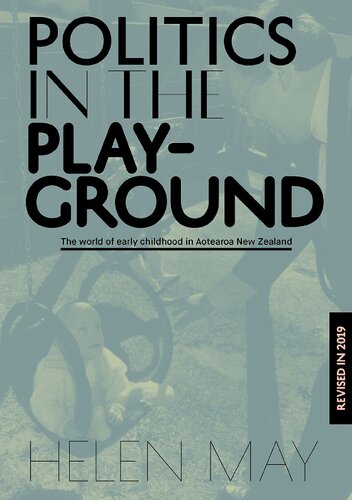

Most ebook files are in PDF format, so you can easily read them using various software such as Foxit Reader or directly on the Google Chrome browser.
Some ebook files are released by publishers in other formats such as .awz, .mobi, .epub, .fb2, etc. You may need to install specific software to read these formats on mobile/PC, such as Calibre.
Please read the tutorial at this link. https://ebooknice.com/page/post?id=faq
We offer FREE conversion to the popular formats you request; however, this may take some time. Therefore, right after payment, please email us, and we will try to provide the service as quickly as possible.
For some exceptional file formats or broken links (if any), please refrain from opening any disputes. Instead, email us first, and we will try to assist within a maximum of 6 hours.
EbookNice Team

Status:
Available4.6
27 reviews
ISBN 10: 1877372684
ISBN 13: 9781877372681
Author: Helen May
Freshly updated in 2019, the third edition of Politics in the Playground: The world of early childhood in Aotearoa New Zealand is a lively history of early childhood education and care in Aotearoa New Zealand in the postwar era. The book follows on from Discovery of Early Childhood (1997, 2013), which traced the origins of institutional care and education for young children in Europe, US and New Zealand prior to state interest and serious investment. This latest edition brings the story right up to date with developments under the Labour coalition government of Jacinda Ardern. The place of children in New Zealand's social history makes this book a remarkable record of social movements. The postwar search for security, the radicalism of the 1960s and 1970s, the rise of feminism, the role of the state in social issues, increasing employment of women – all have impacted on early childhood education. The language of the debate has shifted from 'social progress' in mid-century, to the economic terminology of the 1990s, some cautious consideration of the young child citizen in the 2000s, followed by the rhetoric of 'risk', the 'vulnerable child' and a new story in this revised edition covering the 2010s. This is an account of critical issues for young children that will interest parents, policy- makers, teachers and students.
Part One / Growth and Expectation 1940s–1960s
1. Psychology of Freedom
Understanding children
Benefits of play
Free play at kindergarten
‘I play and I grow’ at Playcentre
Teaching mothers and motherly teachers
Playway at school
Permissive messages to mothers
Parent campaigns
2. Psychology of Disorder
(Dys)functional families
Working mothers and maternal deprivation
The backyard growth of childcare
Regulating childcare
Blaming mothers
Illegitimate solutions
3. Getting Ahead
The ‘problem’ with education for Maori children
Sylvia Ashton-Warner: ‘the little ones’
Maori children at preschool
Combating disadvantage with a head start
Revolution in learning
Te Kohanga: a chance to be equal
Part Two / Challenge and Constraint 1960s–1980s
4. Politics of Early Childhood
The end of the feminine mystique
Children have rights too
Who gets to preschool?
Liberating preschoolers
National constituency for early childhood
The year of the child – the world of the child
5. Demanding Childcare
Campaign tactics
Attachment and separation
Activism and advocacy
Working women
‘Story of a recommendation’
6. Working with Children
Rocking the cradle
Career at Playcentre
‘Brought to mind’ in family daycare
To ‘teach’ in kindergarten
To ‘work’ in childcare
7. Indigenous Rights and Minority Issues
Maori self-determination
Te Kohanga Reo: outside the mainstream
Kura Kaupapa: transition to school
Early childhood responses
Pacific Islands early childhood centres
Part Three / State Interest and Devolution 1980s–1990s 201
8. Winds of Reform
Political shifts
Against the odds
A foot in the door
Implementing Before Five
National directions
Parents as First Teachers
The kindergarten flagship
9. Measures of Quality
Quality discourses
Who gets to preschool now?
Weaving Te Whariki
Qualified to teach
After Before Five
Part Four / Strategic Directions 2000s–2010s
10. ‘Blue Skies in the Playground’
‘Pathways to the future’
Pay parity resolutions
ABC of private enterprise
‘Nanny State’ divides
Free early childhood education
‘Travelling the pathways’
The Plays of Childhood
11. Agendas for Young Children
Cutting the cost
ECE Taskforce and An Agenda for Amazing Children
Participation priorities and the vulnerable child
A Treaty of Waitangi claim
Refreshing Te Whariki
An OECD drama
Changing worlds of kindergarten and Playcentre
‘Turning the tide’?
References
Abbreviations
Glossary
the playground politics
playground politics funny or die
the playground is for everyone
playground rules book
playground politics song
playground politics 2022
Tags: Helen May, Playground, Politics